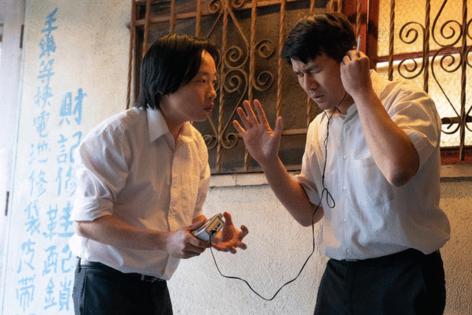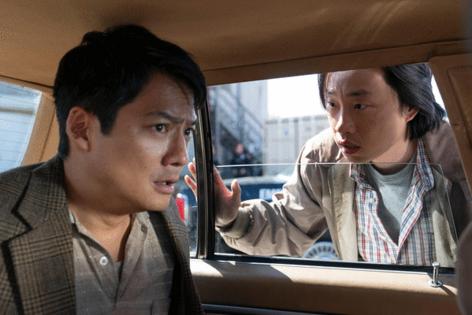'Interior Chinatown' review: Trapped in a police procedural, a background character breaks out
Published in Entertainment News
In the Hulu series “Interior Chinatown,” an average guy named Willis Wu works in his uncle’s Chinatown restaurant. Or so we think. Gradually, it’s revealed that he’s actually a TV character forever trapped in the background of a police procedural.
Created by Charles Yu, adapting his 2020 novel, the rules of the premise are never exactly clear, which keeps you on your toes. It’s a funny and intriguingly surreal conceit. Everyone views themselves as real, but there are all kinds of clues to suggest they really exist inside the artifice of a TV show. Only Willis (Jimmy O. Yang) seems to grasp this after a chain of events set him on a collision course with the stars of “Black & White” (featuring a Black cop and white cop as leads — I laughed!).
Yet another cop, Detective Lana Lee (Chloe Bennet, channeling a winning, Aubrey Plaza-esque deadpan), enters the storyline and, as the token Asian in the police department, is expected to be the Chinatown expert. She’s not. In need of intel, she enlists the help of Willis to work with her. He’s bored and unhappy and thrilled to take part in anything that breaks up his status quo and gives him an excuse to venture outside his neighborhood. (He’s only able to do this by adopting different stereotypes: Delivery Guy, Tech Guy, etc.) Somehow, this new adventure ties back to his older brother, a kung fu ace who has been missing for more than a decade.
As a cop show parody (including “Law & Order”), Yu’s construct is fizzy and entertaining. The lighting is always different when the leads enter a scene, and here’s how Willis describes witnessing that in the book: “Someday you want the light to hit your face like that. To look like the hero. Or for a moment to actually be the hero.” The show is less poetic in the way it conveys that sentiment, relying instead on Yang’s earnest and longing performance as Willis. “Some people are winners and some people are waiters,” goes one line of dialogue and it’s just the kind of taunt Willis is aiming to debunk and it’s terrific seeing Yang channel an entirely different energy and vulnerability than the obnoxious tech bro he played on HBO’s “Silicon Valley.”
Who is Willis beyond his open-faced curiosity and desire for something more? The show leaves that mostly unexplored in the five episodes (out of 10) made available to critics. But the series is a compelling landscape for Yu to explore all kinds of cultural commentary about the Asian American and immigrant experience, as well as strained family relationships, including that of Willis’ parents (Diana Lin and Tzi Ma), who have grown apart in the years since their older son’s disappearance. The grief is unspoken but palpable.
Willis’ best friend, roommate and co-worker, Fatty (Ronny Chieng), is wonderfully grumpy and shares none of Willis’ starry-eyed fascination with the world beyond the few square blocks of their lives. “Nothing exciting ever happens to me or you or anyone we know,” Willis laments early on. Fatty doesn’t care; he’d rather pass the time playing one of the arcade-style video games in the back of the restaurant. (With a few exceptions, the tech here is intentionally 40 years out of date: landlines, old-school TVs, cassette tapes, a Walkman). Fatty wants to be left alone, but instead he finds himself managing an influx of white diners who show up for the privilege of being yelled at by him. It’s an incisive critique of the way white people exotify something as banal as an annoyed waiter at a Chinese restaurant.
“Interior Chinatown” has a lot of fun skewering TV tropes, including the stereotypical characters who topline “Black & White” (played by Lisa Gilroy and Sullivan Jones): “I’m street smart and you’re book smart — you notice things, I know things. We each take turns flying off the handle.”
But “Interior Chinatown” perhaps doesn’t dig past the tropes enough to reveal something more nuanced on the other side. At least, not in the first half of the season. Whether the show sticks the landing is a key question. After five episodes, I’m not sure where it’s headed thematically. You could argue that’s a good thing — keep the audience guessing — but even by the midway point, the narrative occasionally stalls and lacks intention. The show has a binge release, meaning all 10 episodes are available at once; only providing the first half to critics suggests Hulu isn’t fully confident with how things get resolved in the back end. Or maybe the streamer’s executives love it, who knows? But it’s an unusual decision that feels loaded somehow.
Even so, for a series that’s constantly referencing cop cliches, “Interior Chinatown” feels remarkably fresh. That might be its biggest selling point in an era overrun by reboot mania and recycled IP.
———
'INTERIOR CHINATOWN'
2.5 stars (out of 4)
Rating: TV-MA
How to watch: Hulu
———
©2024 Chicago Tribune. Visit chicagotribune.com. Distributed by Tribune Content Agency, LLC.
















Comments